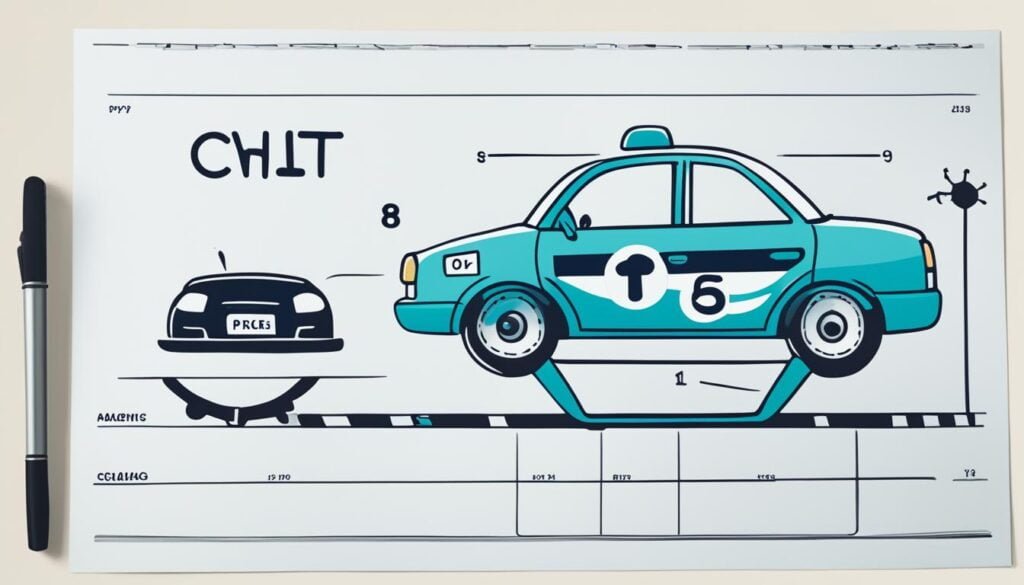When contemplating the acquisition of a vehicle, it is crucial to verify whether the car has been reported as stolen. The Vehicle Identification Number (VIN) serves as the automobile’s fingerprint and is a unique code assigned to each motor vehicle. To ensure the authenticity and legality of the vehicle you intend to purchase, a VIN check is essential. The VIN check cross-references the VIN entered against participating insurer’s theft and salvage records, providing information on whether the vehicle has a record of an insurance theft claim, salvage status, or has ever been reported as stolen.
Key Takeaways:
- Performing a VIN check is crucial when considering purchasing a used vehicle.
- The VIN serves as a unique identifier for each motor vehicle.
- A VIN check verifies if a vehicle has a record of an insurance theft claim, salvage status, or has been reported as stolen.
- Preventing legal troubles and financial losses is one of the primary reasons to check the VIN for stolen cars.
- Trustworthy sources such as the National Insurance Crime Bureau (NICB) or vehicle history providers like VinAudit offer reliable VIN check services.
Why Check VIN for Stolen Car?
Checking the VIN for stolen cars is crucial for several reasons. First, it helps prevent legal troubles and potential financial losses that may arise from unwittingly purchasing a stolen vehicle. By confirming the legitimacy of a vehicle’s ownership and history, buyers can ensure that the car they are buying has not been reported as stolen. Additionally, conducting a VIN check acts as a proactive safeguard and promotes a more secure and informed buying process by providing buyers with the authenticity of the vehicle’s history and ownership.
When purchasing a used car, it’s essential to check the VIN against the stolen car database to avoid any complications down the line. Even if a vehicle appears to be in great condition, it doesn’t guarantee its lawful possession. The stolen car database is a valuable resource that enables buyers to verify the history of a vehicle, ensuring its legality and peace of mind.
By performing a stolen VIN check, potential buyers can:
- Protect themselves from purchasing stolen vehicles, which can lead to legal consequences and financial losses.
- Ensure the authenticity of the vehicle’s ownership and history, avoiding complications in the future.
- Promote a more secure and informed buying process, enabling buyers to make informed decisions.
Conducting a stolen VIN check is a simple and effective way to safeguard against acquiring a stolen vehicle. It’s a proactive step that ensures buyers are making a lawful and informed purchase.
The following table highlights the key reasons why checking the VIN for stolen cars is crucial:
How to Perform a VIN Check
Performing a VIN check is a straightforward process that can help you uncover important information about a vehicle’s history. Here are the steps to follow:
- Locate the VIN: The Vehicle Identification Number (VIN) is a unique code assigned to each vehicle. You can typically find it on the dashboard through the windshield or on the driver’s side door frame.
- Choose a reliable source: There are several platforms where you can run a VIN check. Some trusted options include:
| Platform | Description |
|---|---|
| National Insurance Crime Bureau (NICB) | A nonprofit organization that offers a free VIN check through their VINCheck database. |
| Department of Motor Vehicles (DMV) | Many state DMV websites provide VIN check services. |
| VinAudit | A third-party vehicle history provider that offers comprehensive reports for a fee. |
Choose the platform that best suits your needs and preferences.
- Enter the VIN: Once you’ve selected a platform, enter the VIN into the provided search field. Make sure to double-check the VIN for accuracy before proceeding.
- Complete the check: Follow the on-screen instructions to complete the VIN check. Depending on the platform, you may need to provide additional information or answer security questions.
- Access the report: After the check is complete, you should be able to access a full vehicle history report. This report will contain information about the vehicle’s ownership, accident history, title status, and whether it has ever been reported as stolen.
Performing a VIN check is a crucial step when considering the purchase of a used vehicle. It can give you peace of mind by providing valuable insights into the vehicle’s past and helping you avoid potential scams or legal issues.

Remember, always perform a VIN check to ensure the authenticity and legality of the vehicle you intend to buy.
Where to Run a Free Stolen VIN Check Online
When it comes to running a free stolen VIN check online, there are several reliable resources available. One such resource is the National Insurance Crime Bureau’s (NICB) VINCheck database. This online tool allows individuals to verify a vehicle’s theft status quickly and conveniently. By entering the VIN into the database, users can access information about whether the vehicle has been reported as stolen or salvaged, providing valuable insights into the vehicle’s history.
In addition to the NICB’s VINCheck database, several other online platforms and databases also offer free VIN checks. These platforms provide comprehensive reports that include information on a vehicle’s theft and salvage records, as well as its overall history. When conducting a free stolen VIN check, it is crucial to utilize reputable sources to ensure the accuracy and reliability of the information obtained.
By leveraging these resources, individuals can gain peace of mind and make informed decisions when buying a used vehicle. Conducting a free stolen VIN check online is a crucial step in the vehicle purchasing process, helping buyers avoid potential legal troubles and financial losses associated with inadvertently acquiring a stolen car.
To illustrate the process of running a free stolen VIN check online, consider the following example:
Example Free Stolen VIN Check Process
- Visit the NICB’s VINCheck database website or another reputable online platform.
- Locate the VIN of the vehicle you want to check. This can typically be found on the dashboard through the windshield or on the driver’s side door frame.
- Enter the VIN into the designated search field on the website.
- Complete any additional verification steps required by the platform.
- Review the results provided by the platform, which should include information about the vehicle’s theft status and salvage records.
By following these simple steps and leveraging reliable online platforms, individuals can easily conduct free stolen VIN checks and gain valuable insights into the history and status of a vehicle.
Running a free stolen VIN check online is a proactive measure that helps ensure a safe and secure vehicle purchase. By utilizing reputable sources and conducting thorough VIN checks, individuals can protect themselves from potential risks associated with purchasing a stolen car.
Table: Tips for Running a Free Stolen VIN Check Online
| Tip | Description |
|---|---|
| Choose reputable sources | Utilize trusted websites and databases, such as the NICB’s VINCheck database, to ensure accurate and up-to-date information. |
| Verify the VIN | Double-check the VIN entered to avoid errors and ensure accurate search results. |
| Review the results carefully | Take the time to thoroughly examine the information provided by the platform, paying close attention to the vehicle’s theft status and salvage records. |
| Contact authorities if necessary | If the VIN check reveals that the vehicle has been reported as stolen, immediately contact the local authorities to report the findings. |
Implications of Purchasing a Stolen Vehicle
Inadvertently purchasing a stolen vehicle can have severe consequences. It’s important to be aware of the potential implications to avoid legal troubles, financial losses, and other negative outcomes. Here are some key implications to consider:
- Legal Troubles: Buying a stolen vehicle unknowingly can result in legal issues. If authorities discover that the car you own or are trying to sell is stolen, you could face legal penalties and complications.
- Financial Losses: Purchasing a stolen car means investing in something that doesn’t belong to you. You risk losing your hard-earned money and not having any legal recourse to recover the funds.
- Voided Ownership and Insurance: If the car you bought turns out to be stolen, your ownership rights and insurance coverage may be deemed void. This can lead to a loss of both financial protection and your legal right to own the vehicle.
- Property Confiscation: If law enforcement identifies a stolen vehicle in your possession, they have the authority to confiscate it, leaving you without compensation and potentially facing criminal charges.
- Complicated Resale: Selling a stolen vehicle is illegal, and once it’s discovered, you’ll encounter significant obstacles in reselling it. Finding a buyer willing to purchase a car with a stolen history can be nearly impossible.
- Safety Concerns: Stolen vehicles may have undergone unauthorized modifications and repairs, compromising their safety and performance. There’s an increased risk of mechanical failure and compromised structural integrity.
- Negative Credit Impact: If you financed the purchase of a stolen vehicle, you’ll still be responsible for the loan even if the car is confiscated or deemed unrecoverable. This can lead to significant financial strain and a negative impact on your credit score.
Given these potential implications, taking the necessary precautions when buying a used vehicle is crucial. Performing a VIN check to avoid inadvertently acquiring a stolen car is a proactive step that can help safeguard your finances, legal standing, and peace of mind.
Conclusion
Performing a thorough VIN check for stolen cars is an essential step in the vehicle purchasing process. By verifying the authenticity and legality of the vehicle, buyers can protect themselves from potential legal and financial consequences. Utilizing reliable sources and running comprehensive VIN checks enables buyers to make informed decisions and have peace of mind before investing in a vehicle.
By conducting a VIN check, individuals can cross-reference the Vehicle Identification Number against participating insurer’s theft and salvage records. This process provides crucial information about the vehicle’s history, including whether it has been reported as stolen, has salvage status, or has any insurance theft claims. This data empowers buyers to identify the true ownership and eliminate the risk of unwittingly purchasing a stolen vehicle.
In the digital age, running a VIN check for stolen cars is easy and accessible. Various platforms like the National Insurance Crime Bureau (NICB) and vehicle history providers like VinAudit offer VIN check services. By entering the VIN into these platforms, buyers can access a full vehicle history report, giving them a comprehensive overview of the vehicle’s background and allowing them to make an informed purchase decision.
Don’t risk legal troubles, financial losses, or other complications that come with purchasing a stolen vehicle. Prioritize your safety and peace of mind by incorporating a VIN check into your vehicle buying process. This simple step ensures that you are making a secure and informed purchase, protecting you from the potentially dire consequences of owning a stolen car.

